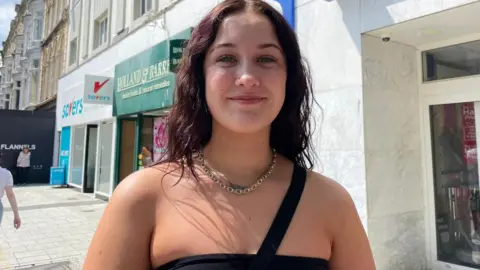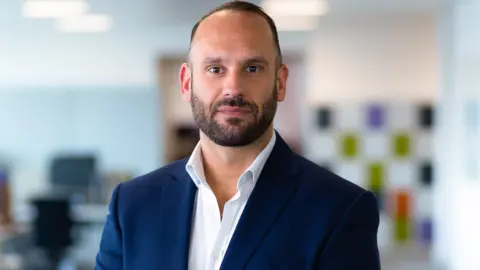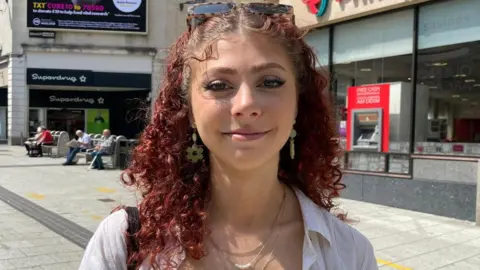Buy now, pay later: People using service for food, warn charities
 BBC
BBCMore young people are getting into buy now pay later debt as some turn to schemes for essentials, charities say.
Firms such as Clearpay, Zilch and Klarna let people pay their debt off over a short period, but many charge a fee if payments are missed.
Molly Dixon went "cold turkey" after some of her friends ran up "£500 worth of debt they can't pay" and she "never wants it to get to that point".
The UK government said it was ensuring schemes were "safe and regulated".
Richard Lane, director of external affairs at Step Change, said the debt charity had seen "more and more young people coming to us" with buy now, pay later debt since the start of the cost of living crisis.
He added: "These products are being primarily marketed to young people.
"We are incredibly worried that people are taking out credit without necessarily understanding what they're committing to and what the repercussions are if they're unable to pay."
Mr Lane told Wales Live that buy now, pay later was "a great product" that worked well for many people to spread the costs of larger purchases.
But the market is unregulated and debt charities have been demanding that the UK government brings it under the oversight of the Financial Conduct Authority (FCA).
Klarna said it had measures to help protect consumers and restricts the use of services after missed payments to stop debt from building up, with 99% of its lending getting repaid.

Citizens Advice Cymru said 8% of the people it helped in February had used this type of credit to pay for essentials such as food and toiletries.
Director Simon Hatch said: "We know that many people are staying at home, having to live with their parents, and they're working.
"But that still doesn't mean that they're earning sufficient to contribute or pay all of their bills. And what we are seeing is that people are going into debt to support their buy now, pay later needs."
Cardiff University student Mia Herford, 21, used a lending scheme once and thought it was "quite good" at the time.
"But then I realised I wasn't a massive fan of it because then I was seeing the payments coming out of my account after the following months," she added.

Not everyone has had problems and Evie Old said she would use it again."I've used like Klarna and things like that when I'm buying quite a few items of clothing," she said.
"It's not saving money but it feels like you are because you're spreading the cost out over a few months."It was pretty positive, I would do it [again], I didn't have any problems with it."
Molly Dixon said: "You feel like 'oh great I'm getting a bunch of new clothes' or whatever it is - you're buying but then the payments come out every month and you're still thinking 'wait I actually couldn't afford this even then, why am I still paying for it'?
"I think it's marketed to - and I'm literally stood here in a Pretty Little Thing top - consumerism and fast fashion. It just makes it so much easier to buy into the trends."

Talia Lieberman, 22, said she tried to avoid buy now, pay later but had used it "for one-off purchases" for "clothes or shoes" in order to be able buy things she would not otherwise be able to afford.
She said she had never been worried about repayments.
"For me it was positive because I think I've been quite responsible with it," she added.
Cardiff Metropolitan University has brought in a specialist debt advisor to help students.
Leanne Herberg, the university's money advice coordinator, said she believed short-term loans were spreading and people were now using them for takeaways.
She added: "They have that option and the worry is if you are putting everything on to a [buy now, pay later] credit payment then that is really is hard to manage and keep a track of in terms of the repayments subsequently going out and making sure that you've got the budget to accommodate the repayments."
Philip Belamant is the founder of Zilch, which is regulated by the FCA.
He said some similar schemes were designed "for retailers, not consumers" with the aim of some companies being to keep shoppers on the website and "hurry customers through the journey".
In 2021, the UK government said it would regulate buy now, pay later products.
Proposed draft legislation is being consulted on, but there is no set timeframe for regulation.
The Treasury said: "While these products can help consumers manage their finances when used appropriately, we are making sure the product is safe and regulated - protecting borrowers from falling into problem debt."
- Wales Live, BBC One Wales at 22:40 on 21 June or catch up on iPlayer

- BINGE-WORTHY BOX SETS: A collection of incredible dramas made in Wales
- RELAX WITH RADIO WALES: Our go-to playlist to relax, unwind, and chill out

